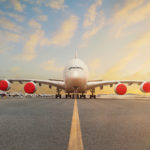In the wake of groundings and travel restrictions due to the COVID-19 pandemic, MRO companies will be forced to adapt their businesses.
In an interview filmed before the outbreak of coronavirus, FINN reporter Andy Marlor caught up with David Stewart from Oliver Wyman to talk about how the industry was changing in the wake of shifting market states caused by the collapse of airlines including leisure carrier Thomas Cook. He also talked about a slow shift towards greater involvement of digital technologies.
Industry is “attuned to being responsive”
Stewart said MRO was an industry which was already accustomed to adapting to change. “We have a very active AOG business, plans go wrong things happen the whole time. So it’s attuned to being responsive.”
At the time of Thomas Cook’s demise, along with the collapse of Air Berlin and Monarch, there had been no real drop in demand for air travel. Stewart said the collapses were mainly down to the issue of over capacity.
Airline collapses caused by over capacity
“Fundamentally, those exits from the market, if you want to call it that, they’re down to really fundamentally two things. One is there is too much capacity or has been in recent times. So you’ve had the, the bigger collapses of Air Berlin, Monarch and Thomas Cook, you’ve had a lot of smaller ones. So it’s really an adjustment of capacity. There’s been too much.”
“The other one, which I would suggest is, if you’ve got a wrong business model, which, you know, some would argue the charter is a wrong business model or is a business model that needs to adapt to compete with the low fare carriers, then some of them just did not adapt quick enough. So those two factors.”
Shift to digial will be “marathon, not a sprint”
Stewart said the industry would be moving cautiously towards greater digitisation: “Clearly, digital is like kind of ‘the thing of the moment’, you can’t go anywhere with some announcement about something digital with these new platforms. But I think, in reality, this is very much an evolution and not a revolution. It’s, if you think about the nature of the fleet, there’s 27,000 planes flying around at the moment, of which just 13 per cent are these next generation platforms that enable this smart technology. In 10 years time, it’ll still only be 50 per cent of the fleet.”
“So actually, the relative churn of what’s happening is relatively quite slow. The opportunities there and for sure, the industries, you know, it’s evolving, but it’s still kind of a relatively slow programme. And you’ve got to get it right rather than come out. This is a marathon, not a sprint.”

